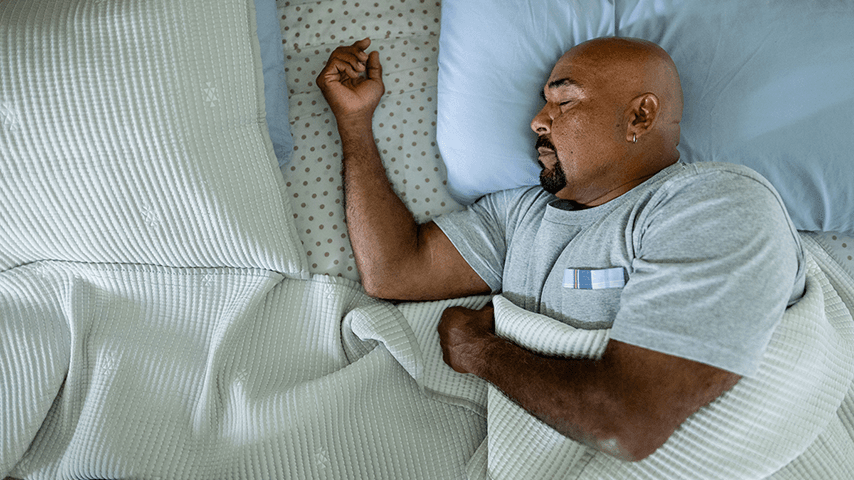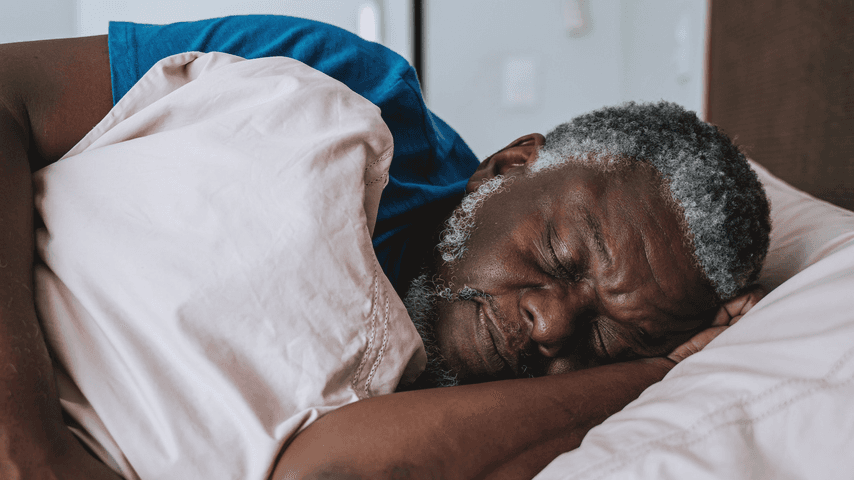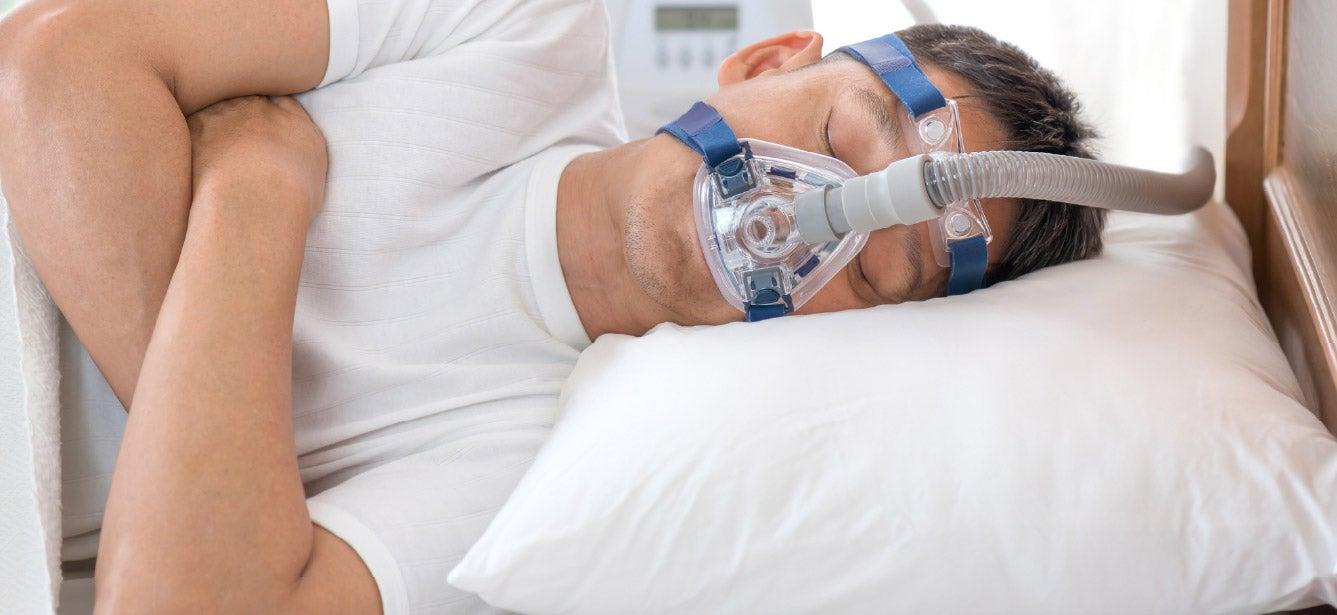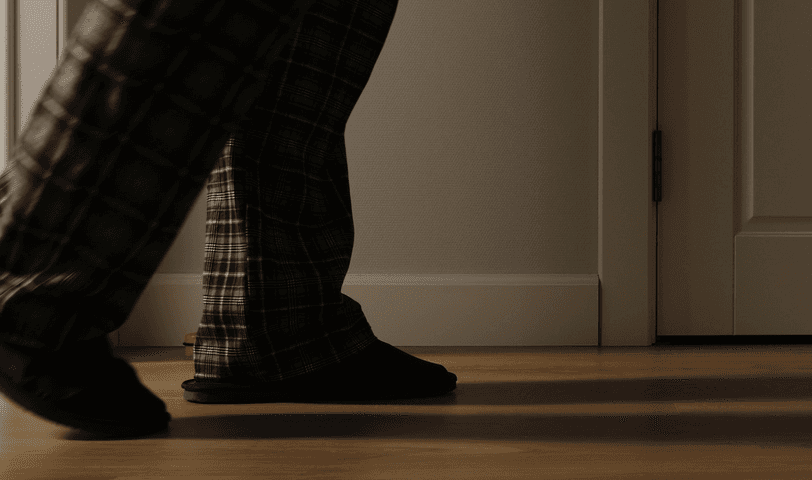
Related Topics
Nothing much beats a solid night’s sleep.
A night uninterrupted by worry, pain, or the need to go to the bathroom. A night undisturbed by barking dogs, snoring partners, or sagging mattresses. That wondrous feeling of waking up completely refreshed, revitalized, and ready to take on the day.
Hold up. Is that actually a thing?
“Believe it or not, it can be—and it should be,” said Gretchen Dueñas-Tanbonliong, Associate Director of Health and Wellness at NCOA. “Getting the recommended 7–9 hours of quality sleep every night is extremely important to our physical and cognitive well-being. It’s also true that many of us struggle to do it, especially as we age.”
Age itself isn’t to blame, she pointed out. But many things that go along with aging can be.
Anxiety over finances, health, or the state of the world … grief and depression over people we’ve lost … the social isolation of retirement … chronic pain and certain prescription medications … for these reasons and more, there’s a lot to lose sleep over. And after a few nights or weeks of tossing and turning without relief, it can be tempting to throw up our hands and reach for the sleeping pills. According to the Cleveland Clinic, as many as 1 in 3 people age 65 or over take some form of prescription or over-the-counter (OTC) sleep aid.1
But those pills can come at a cost: not only to our bank accounts, but also to our long-term health, and—ironically—even to sleep itself. That’s where natural sleep remedies come in. Compared to sleep medications, many of these remedies are non-habit forming, have fewer side effects, and are generally safe to use.
Ready to learn more? We cover the major points below.
The advantages of natural sleep remedies
On the other hand, many natural remedies to help you sleep avoid these pitfalls. That makes them an attractive choice for people who want to improve their sleep quality in a way that supports a healthier overall lifestyle.
Benefits include:
- Sustainability: Generally, natural sleep remedies are not habit-forming. There’s little chance that you’ll become physically dependent on them. As long as your doctor gives you the green light, you can use them when needed. And certain strategies, such as practicing good sleep hygiene and boosting your physical activity (more on both below) are excellent long-term options.
- Safety: Keep in mind that the FDA does not test or regulate herbal supplements and over-the-counter vitamins commonly used for sleep. That said, studies show that many of these natural sleep remedies are safe to use and have few negative side effects.5 Some do interact with specific medications; your doctor or pharmacist can help you sort out any risks.
- Well-being: Natural remedies for sleep also can be part of a healthy lifestyle—one of many positive choices that support long-term wellness. For example, daily movement, meditation, acupuncture, and essential oils can help relieve chronic pain and stress, as well as improve your physical fitness, boost your emotional health, and lower your blood pressure.
Below, we’ll take a look at some natural sleep strategies you can try at home. Of course, your primary health care provider knows you best. Before starting any new supplement or routine, it makes sense to check in and ask their advice.
Natural remedies to help you sleep
When it comes to getting better sleep, there are several natural approaches you can take.
Practice good sleep hygiene
No matter our age, it’s always a good idea to condition our minds and bodies for sleep. That starts with putting together and sticking to a consistent schedule. Going to bed and getting up at roughly the same time every day supports our circadian rhythm—our 24-hour internal body clock that tells us when to feel sleepy and when to wake up.
“There are things you can do to support your success, too,” Dueñas-Tanbonliong said. “That’s what ‘sleep hygiene’ really means.”
Try some of these proven techniques:
- Mind your consumption. Avoid eating heavy meals and drinking caffeinated coffee, teas, and sodas late in the day. And be aware of the alcohol paradox. While your favorite adult beverage might help you fall asleep, it won’t keep you there. And alcohol use can worsen insomnia over time.
- Find your routine. Create a ritual that signals bedtime is approaching. About an hour before turning in, engage in a soothing activity that helps your body and mind wind down: take a bath; write in a journal; listen to some relaxing music.
- Ditch your devices. Blue light from phones, tablets, laptops, and e-readers disrupts circadian rhythms. And “doom-scrolling” through headlines, news, and social media posts can cause anxiety and sleeplessness. If you enjoy reading before bed, consider swapping out your device for a hard-copy magazine or audio book instead.
- Don’t force it. If you haven’t fallen asleep after about 20 minutes, experts recommend getting out of bed. The same is true if you wake up in the middle of the night and can’t fall back asleep. Try not to worry; instead of staring at the ceiling, get up and try reading or another calm activity until you feel sleepy.
- Optimize your sleep environment. Most sleep experts recommend that you reserve your bedroom for sleep. This trains your brain to associate one with the other. Resist the urge to eat, work, or watch TV here. Other strategies include:
- Setting your scene. Create a calm atmosphere by turning off the lights, keeping the temperature comfortable, and banishing disruptive noise. Consider an eye mask, a white noise machine, or even soft ear plugs if you can’t completely eliminate light and sound.
- Addressing your health. Certain conditions, like sleep apnea, can interfere with restful sleep. Elevating your head and back can open your airways and help you snore less. And eliminating pressure points can help with managing chronic pain for better sleep.
- Replacing your mattress. A good mattress can make or break your sleep quality. Advanced technology and design means that many manufacturers offer models that are good mattresses for back pain that can fit adjustable beds, while also being supportive mattresses for heavier people.
- Try mindfulness meditation Mindfulness meditation may sound intimidating, but it doesn’t have to be. Anyone can follow a few simple strategies to reduce stress, encourage relaxation, and improve sleep. These include:
- Focusing on your breath. Deep breathing helps activate your body’s parasympathetic (calming) nervous system. Try the “square” technique: inhale through your nose for four seconds, hold it for four, and exhale through your mouth for four. Repeat up to 10 times.
- Finding your mantra. Repeating a comforting word or phrase can help relieve anxiety and calm your mind. Choose something that’s positive, empowering, and meaningful to you. Sit in a quiet place, center yourself with a few breaths, and repeat your mantra.
- Building your practice. Try using meditation as part of your regular nighttime routine—an extension of your sleep hygiene. Set aside 5-10 minutes during that last hour before bedtime to breathe, affirm, and refine what works for you.
- Consider acupuncture. Acupuncture is a traditional Eastern practice that uses very thin needles to influence the body’s energy, or Qi. Acupuncture can provide pain relief, alleviate arthritis symptoms, reduce stress and anxiety, and address digestive issues, among other things. For these reasons, many people find it to be an effective natural sleep remedy. Acupuncture has very few side effects, and most are minor. Still, researchers continue to study its safety and overall effectiveness. Acupuncture also can be expensive; it’s important to consider whether your health insurance will pay for it. In very specific circumstances, Medicare will cover the cost of up to 12 visits in 90 days for chronic low back pain—a common cause of poor sleep.
-
Other natural sleep aids. Unlike many OTC and prescription sleeping pills, most natural sleep aids and essential oils aren’t habit-forming. Using them won’t cause you to become dependent on them for sleep—and they’re generally safe. Some of the most common natural sleep aids include:
- Cannabidiol (CBD)
This hemp-derived compound won’t get you high. But it may help you sleep better. It’s not entirely clear why; some research points to reduced stress and pain. While generally safe, CBD can have side effects to be aware of before using it.7 - Lavender
The scent from this bright purple flower is subjectively soothing. Even better, research shows that lavender essential oil can calm anxiety, reduce pain, and improve sleep duration and quality.8,9 - Magnesium
Magnesium is a precursor, or building block, for the hormone melatonin (see more below). Magnesium also may reduce levels of cortisol (a stress hormone); relax the muscles; and calm the nervous system.10 - Melatonin
Melatonin is a hormone that’s connected to circadian rhythm. Your brain produces it in response to darkness. Supplements can help you sleep better, though the jury’s out when it comes to chronic insomnia.11 - Passionflower
Passionflower is a climbing vine whose plant contains GABA—a chemical that promotes sleep. Studies indicate that passionflower extracts and herbal teas can improve insomnia symptoms and sleep quality.12,13 - Valerian root
People who use this herbal supplement say that it helps them sleep better. However, very little research exists objectively and conclusively to support this.14 This research does show that valerian is generally safe to use, however, if not effective.
- Cannabidiol (CBD)
As always, it’s important to check with your doctor about possible interactions with any existing prescriptions or health conditions you may have before trying any natural sleep aid.
Exercise to help you sleep
Regular physical activity is a proven natural sleep remedy. And it doesn’t have to be intense or lengthy, either. From gentle gardening to walking the dog, the act of moving our bodies leads to better rest.
How exercise improves sleep
There are so many benefits to regular physical activity. In addition to building strength, improving balance, and increasing our stamina, it boosts our “sleep fitness,” too. Exercise6:
- Regulates circadian rhythm
Physical activity, especially done at the same time each day, helps align our internal body clock with the outside world. This helps maintain a healthy sleep-wake cycle. - Reduces stress
Exercise reduces cortisol, a hormone that can disrupt our sleep. And participating in physical activities we enjoy improves our mood and promotes relaxation. - Improves sleep quality
Regular exercise can help us fall asleep faster and stay there longer. Research shows that aerobic exercise works particularly well, as long as it’s not too close to bedtime.
Practical tips
Most of us aspire to consistent exercise. Many of us also have struggled to succeed at one time or another.
“When it comes to better sleep, remember that every effort is a good effort,” NCOA’s Dueñas-Tanbonliong said. “You don’t have to commit to walking a mile every day, swimming 20 laps, or signing up for some kind of boot camp strength training class out of the gate. Building up to your own routine takes time—but the rewards of each step are immediate.”
To make exercise more enjoyable, she recommends:
- Choosing activities you like
Do you hate running but love to dance? Fantastic; dancing is a great aerobic activity. If you’re not a “gym person” but find joy working in your yard, do that—hauling compost, digging up plants, and pruning bushes is good for your muscles, too. - Adjusting for weather and mobility
Take your outdoor walk indoors when it’s cold, rainy, or snowy. Shopping malls, underground garages, or a treadmill at the gym are good options. If you have balance issues or joint pain, you might try chair yoga or water aerobics. - Sticking to daytime
Working out can energize you—which means that exercising too close to bedtime can actually prevent you from falling asleep. Most experts suggest wrapping up your routine no later than four hours before turning in for the night.
Cognitive behavioral therapy for insomnia (CBT-I)
Cognitive behavioral therapy for insomnia is a highly proven, non-drug treatment for chronic sleep disturbance. It works by helping you change deeply ingrained negative thoughts and behaviors around sleep. Techniques used may include sleep restriction (limiting the time spent in bed), stimulus control (like getting out of bed if you can’t sleep), and relaxation training. CBT-I generally lasts between six to eight weeks.
Because CBT-I is a form of psychotherapy, your health insurance may pay for it. This depends on your carrier and coverage, however. It’s a good idea to check your policy documents and ask about potential co-pays before you begin treatment.
The limitations of sleeping pills
First: the term “sleeping pills” describes a broad category of medications that includes both over-the-counter (OTC) tablets or capsules containing antihistamines, and prescription drugs called hypnotics. OTC sleeping pills are widely available; prescription sleep aids require a visit to your doctor.
So: What’s the big deal about taking them? If more than 30% of us already do, could it really be that bad?
“Maybe not, at least in the short term,” Dueñas-Tanbonliong said. “Your health care provider is the best person to answer that question. No matter what, though, it’s important to know that sleeping pills do have downsides.”
These include:
Effects
Many OTC and prescription sedatives can make you feel drowsy or groggy the next morning. People who use them may also experience negative side effects including headaches, dizziness, or confusion; and digestive issues such as gas, constipation, or diarrhea. If you already have sleep apnea, some sleeping pills can make it worse.1
Interactions
The active ingredient(s) in both OTC and prescription sleeping pills can change the way certain other medications work—and can be dangerous for people with specific health conditions. Antihistamines, for example, negatively interact with gabapentin (a drug used to treat neuropathy) and can aggravate existing cardiovascular, liver, and kidney disease.2
Dependence
Sleeping pills can be habit-forming. With long-term use, you may become physically reliant on them. When you stop taking the pills, you can experience “rebound insomnia” and be unable to sleep once again. And prescription sedatives—especially those containing barbiturates or benzodiazepines—carry the additional risk of misuse and addiction.2,3,4
For these reasons, health care professionals strongly advise that you restrict these types of sleeping pills to a narrow window of time. “If you’re awake most of the night because of a stressful event, a sedative can be useful to help reset your sleeping pattern,” Dueñas-Tanbonliong explained. “But if you have chronic insomnia or an underlying health condition that interferes with your sleep, sedatives won’t solve the problem and may even make it worse.”
The bottom line
Sleep keeps our bodies and minds healthy and resilient as we age. That’s why it’s important to get consistent, good-quality sleep: at least 7–9 hours each night.
Still, certain age-related realities often get in the way. Chronic pain, health conditions, caregiving demands, social isolation, and other stressors can keep us up at night. And while it can be tempting to reach for a bottle of sleeping pills, over-the-counter and prescription sedatives both can have unpleasant side effects and be habit-forming, too.
Many natural remedies to help you sleep are available, effective, and safe—especially when integrated into healthy lifestyle habits. These include getting regular exercise, practicing good “sleep hygiene,” and managing stress through meditation. Studies show that some of the best natural remedies for sleep include cannabidiol (CBD) extract, lavender, magnesium, melatonin, and passionflower. Your health care practitioner can help you sort through the options, including any potential medication interactions to be aware of.
Finally—if it makes sense and is financially possible for you—investing in a new mattress can make a world of difference. Start by learning about some of the best mattresses and how they can help improve sleep quality.
FAQ
What are the best natural remedies for sleep?
There’s no one-size-fits-all answer; getting good, deep sleep depends on many individual factors such as age and overall physical and mental health. That said, proven strategies include practicing good sleep hygiene; getting regular exercise; trying mindfulness meditation; and using herbal supplements and essential oils approved by your health care provider, among other things.
Is physical activity a good natural sleep remedy?
Absolutely. And you don’t have to be a marathoner to benefit from it. Regular movement that includes aerobic exercise, strength training, and balance work all can lead to better sleep. Choose activities you enjoy and that are appropriate for your mobility. And remember to avoid any strenuous exercise in the hours before bed; the boost of energy you feel afterwards may work against your sleep goals.
Can I use melatonin, CBD, or other supplements as natural remedies for sleep?
Quite possibly. Many herbals and essential oils are effective and safe to use for sleep, at least in the short term. Keep in mind that research into these supplements is ongoing. And whether or not they work for you requires some trial and error. It’s always a good idea to ask your health care provider before starting a new supplement, just to be sure you won’t experience any unwanted medication interactions or side effects.
What is a good natural sleep remedy to help with sleep apnea?
Some good natural sleep remedies to help with sleep apnea include sleeping with your head, shoulders, or torso at an incline to help clear airways; stop smoking or drinking alcohol; or losing weight. It's important to speak to your doctor about a possible sleep apnea diagnosis.
Sources
1. Cleveland Clinic. Sleeping Pills. June 22, 2024. Found on the internet at https://my.clevelandclinic.org/health/treatments/15308-sleeping-pills
2. Drugs.com. Sleep Aid Interactions. Found on the internet at https://www.drugs.com/drug-interactions/doxylamine,sleep-aid.html
3. Cleveland Clinic. Barbiturates. June 14, 2022. Found on the internet at https://my.clevelandclinic.org/health/treatments/23271-barbiturates
4. Cleveland Clinic. Benzodiazepines (Benzos). January 3, 2023. Found on the internet at https://my.clevelandclinic.org/health/treatments/24570-benzodiazepines-benzos
5. Ji Won Yeom et al. Herbal and Natural Supplements for Improving Sleep: A Literature Review. Psychiatry Investigation. August 2, 2024. Found on the internet at https://psychiatryinvestigation.org/journal/view.php?doi=10.30773/pi.2024.0121
6. Priyanjana Pramanik, MSc. How exercise resets your body clock and improves sleep patterns. News Medical. February 4, 2025. Found on the internet at https://www.news-medical.net/news/20250204/How-exercise-resets-your-body-clock-and-improves-sleep-patterns.aspx
7. Peter Grinspoon, MD. Cannabidiol: What we know and what we don’t. Harvard Health Publishing. April 4, 2024. Found on the internet at https://www.health.harvard.edu/blog/cannabidiol-cbd-what-we-know-and-what-we-dont-201808242496
8. National Center for Complementary and Integrative Health. Lavendar. February 2025. Found on the internet at https://www.nccih.nih.gov/health/lavender
9. Angela Smith Lillehei et al. Effect of Inhaled Lavendar and Sleep Hygiene on Self-Reported Sleep Issues: A Randomized Controlled Trial. The Journal of Alternative and Complementary Medicine. July 2, 2015. Found on the internet at https://pmc.ncbi.nlm.nih.gov/articles/PMC4505755/pdf/acm.2014.0327.pdf
10. Caitlin Geng. Does magnesium help you sleep? Medical News Today. Aug. 1, 2023. Found on the internet at https://www.medicalnewstoday.com/articles/magnesium-for-sleep
11. National Center for Complementary and Integrative Health. Melatonin: What You Need to Know. July 2022. Found on the internet at https://www.nccih.nih.gov/health/melatonin-what-you-need-to-know
12. Mahesh Kumar Harit et al. Randomized, Double-Blind, Placebo-Controlled Study of Passiflora incarnata in People with Stress and Sleep Problems. Cureus. March 20, 2024. Found on the internet at https://www.cureus.com/articles/238136-randomized-double-blind-placebo-controlled-clinical-study-of-passiflora-incarnata-in-participants-with-stress-and-sleep-problems#!/
13. A Ngan et al. A double-blind, placebo-controlled investigation of the effects of Passiflora incarnata (passionflower) herbal tea on subjective sleep quality. Phytotherapy Research. August 2011. Found on the internet at https://pubmed.ncbi.nlm.nih.gov/21294203/
14. Valéria Valente et al. Does valerian work for insomnia? An umbrella review of the evidence. European Neuropsychopharmacology. May 2024. Found on the internet at https://www.sciencedirect.com/science/article/pii/S0924977X24000294



